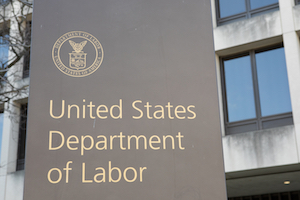 Citing the current lack of a “compelling policy objective that comports with the Department’s mandate,” the American Retirement Association has commented that the Labor Department shouldn’t call out climate-related risks for special attention.
Citing the current lack of a “compelling policy objective that comports with the Department’s mandate,” the American Retirement Association has commented that the Labor Department shouldn’t call out climate-related risks for special attention.
The comments came in response to the Labor Department’s publishing earlier this year a Request for Information seeking public comment on “what actions, if any, the department should take under federal law to protect retirement savings and pensions from risks associated with changes in climate.” That RFI, in turn, followed President Biden’s Executive Order on Climate-Related Financial Risk, which directed the department to identify actions it can take under ERISA, the Federal Employees’ Retirement System Act of 1986 and other relevant laws to safeguard the life savings and pensions of U.S. workers and families from the threats of climate-related financial risk.
At a high level, the American Retirement Association’s response comments that the Department of Labor’s efforts to comply with the Executive Order “should focus on ensuring that ERISA plan fiduciaries have prudent processes in place for analyzing all financial risks, including climate-related financial risk, if relevant.”
With regard to reporting on those risks, specifically on Form 5500, the comment letter notes that “the Department should not require ERISA plans to report information relating to climate-related financial risk because it has not explained its rationale or expectations for how doing so would support its mandate to supervise and enforce ERISA, and it will increase administrative burdens on plans and service providers.”
RFI Response
The response goes on to provide specific, detailed answers to several questions in the RFI, largely in line with the perspective that while climate-related factors can constitute financial risk, those wouldn’t necessarily outweigh other financial risks. “ARA is concerned that undue emphasis on climate-related financial risk would expose the plan fiduciary to unwarranted liability and litigation risks. The Department should instead rely on existing ERISA principles and practices,” it states.
The response also comments that, “Until data relating to climate-related financial risk become more available and understandable, the risk and its significance cannot be reliably identified or assessed by ERISA fiduciaries. Once a uniform system of providing sound information is available, plans will be better positioned to assess climate-related financial risk.”
Ultimately, while supporting the continued education of participants and IRA owners about financial risks (not just climate-related financial risk), the ARA advises that, “the Department should not deviate from requiring prudent fiduciary processes and deferring to fiduciaries’ judgment of how any particular risk, including climate-related financial risk, factors into decisions. We strongly believe that a regulatory preference for investment theories that evaluate climate change contravenes ERISA’s fundamental deference to fiduciaries’ judgment. Longstanding ERISA principles require the Department to be neutral in administering and enforcing ERISA.”
The May 16 comment letter is available here.
- Log in to post comments
